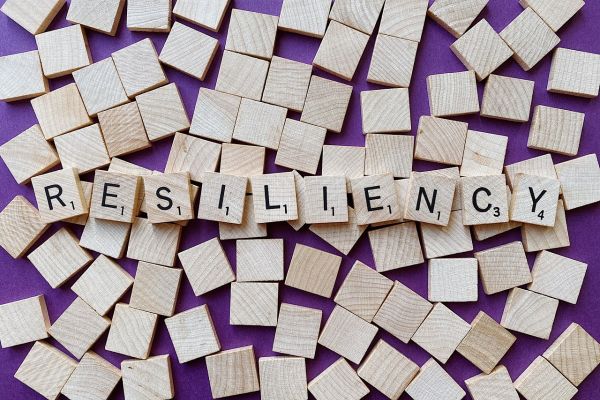
Resilience
Resilience is the psychological quality that allows some people to be knocked down by the adversities of life and come back at least as strong as before. Rather than letting difficulties, traumatic events, or failure overcome them and drain their resolve, highly resilient people find a way to change course, emotionally heal, and continue moving toward their goals.

Psychologists have identified some of the factors that appear to make a person more resilient, such as a positive attitude, optimism, the ability to regulate emotions, and the ability to see failure as a form of helpful feedback.
Optimism, for instance, has been shown to help blunt the impact of stress on the mind and body in the wake of disturbing experiences. That gives people access to their own cognitive resources, enabling cool-headed analysis of what might have gone wrong and consideration of behavioral paths that might be more productive.
Other aspects of resilience’s roots remain under study. There does appear to be a genetic predisposition for resilience, for instance; but early environments and life circumstances play a role in how resilient genes are ultimately expressed.
Not necessarily; people who have undergone trauma can be—and often are—highly resilient. In some cases, however, traumatized individuals may develop maladaptive coping skills, such as substance use, that negatively impact them and may reduce their ability to cope with future challenges.
Many factors that determine resilience—such as genetics, early life experiences, and luck—can’t be modified. But specific resilience-building skills can be learned. These include breaking out of negative thought cycles, pushing back against catastrophizing, and looking for upsides when faced with setbacks.
After experiencing trauma, many people find deeper psychological and spiritual meaning in their lives, known as post-traumatic growth. It doesn’t always occur immediately after the trauma, and the individual may still experience symptoms of anxiety, depression, or flashbacks.

Getting through pain and disappointment without letting them become overwhelming isn’t necessarily easy for anyone. But researchers have begun to uncover what more resilient people do to emotionally and mentally carry on after the death of a loved one, a job loss, chronic or acute illness, or another setback. What they’ve learned may help others become more resilient themselves.
For instance, do you attribute personal and professional setbacks solely to your own inadequacy—or are you able to identify contributing factors that are specific and temporary? Do you demand a perfect streak—or are you able to accept that life is a mix of losses and wins? In each case, the latter quality has been tied to greater levels of resilience.
Healthy habits—getting enough sleep, eating well, and exercising—can reduce stress, which may, in turn, boost resilience. Similarly, being sure to nurture close relationships can help an individual find support when trouble arises. Regularly thinking about morals and actively living according to one’s values have been linked to higher resilience.
Any crisis, such as the coronavirus pandemic, can test resilience. Looking to loved ones for help and emotional support, increasing self-care, and focusing on the aspects of the situation that are under your control can help you weather almost any storm.
A locus of control can be internal—meaning that an individual perceives that they are in control of what happens to them—or external, meaning that an individual attributes all that happens to them to external factors. An internal locus of control is tied to greater resilience.
Yes. For many, bringing an external locus of control inward requires a significant mindset change; like any skill, it takes practice and repetition. In the short term, it helps to work on being decisive and taking concrete actions when faced with adversity, rather than responding passively.
Living through a traumatic childhood can leave deep scars, but healing is possible. Talking to a loved one or therapist can help immensely. Research has found that reframing trauma—accepting that you were not to blame for abuse, for instance—can help adults feel empathy for their younger self and recognize their many strengths.

To fail is deeply human; everyone, no matter their background, skillset, or life story, will fail spectacularly at least once in their life. Its commonplace nature, however, doesn’t mean that experiencing a major loss or setback is easy or fun—or that it’s widely accepted in a winner-takes-all culture that prioritizes success at all costs.
But learning to be okay with making mistakes, big or small, is a critical skill—one tied not only to resilience but also, perhaps, to future success. One recent study, for example, found that young scientists who experienced a significant setback early in their career actually went on to greater success than scientists who had seen early wins.
You don’t have to pretend that it’s pleasant to fail or ignore the frustration that arises when a goal falls out of reach. Instead, accepting the emotions that came with the setback, being curious about why things went wrong and how you can improve in the future, and practicing self-compassion can help.
Becoming okay with making mistakes helps build better emotional regulation, which can benefit someone in a wide variety of domains from relationships to the workplace. Further, analyzing and accepting a setback can provide lessons that will stop the failure from repeating itself in the future.
Many successful people—from Steve Jobs to J.K. Rowling—report that they moved past major early failures by evading "the rumination trap” and avoiding a spiral into negative thinking.














